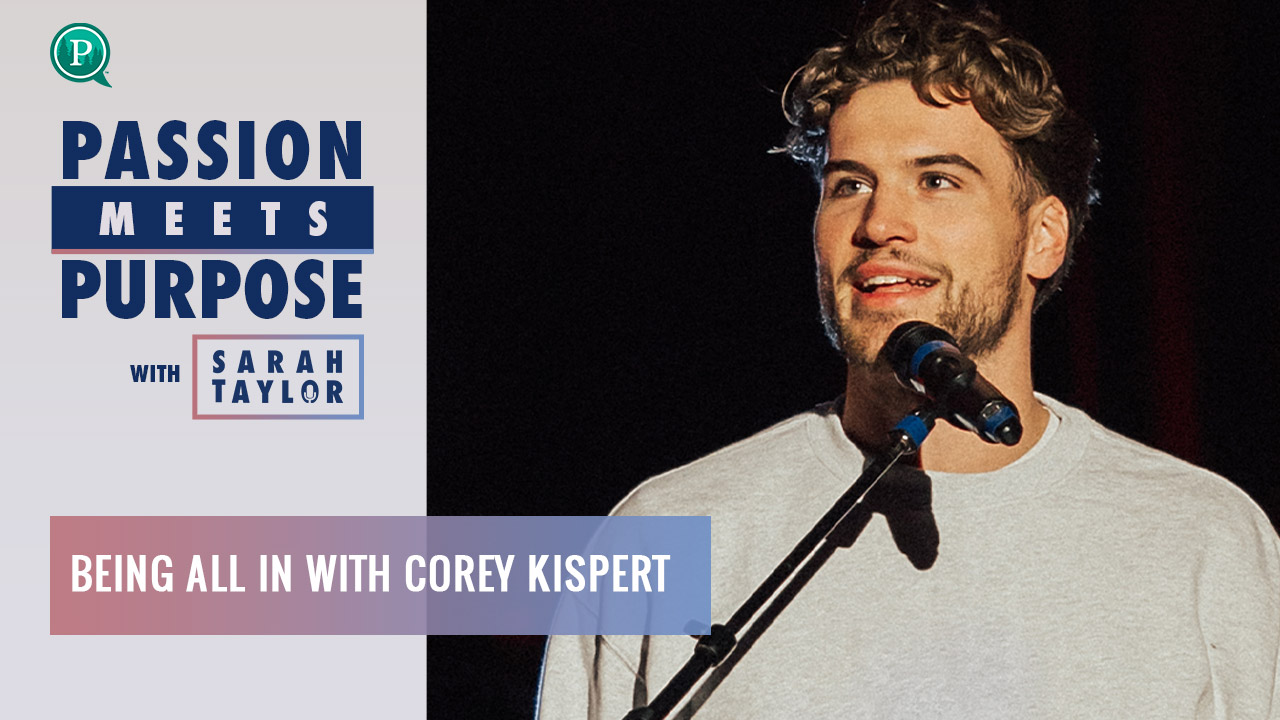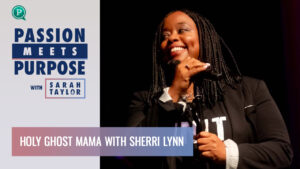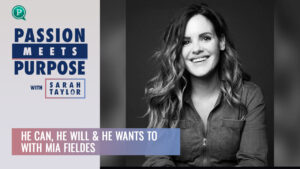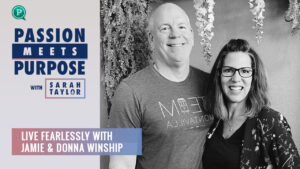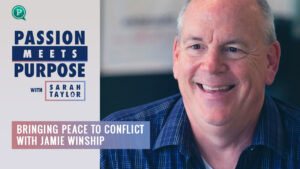Working in a field that doesn’t leave room for rest, means Corey Kispert has to find it in other ways. How does he give his all to the platform, glorify God and not lose himself? Join Sarah Taylor & Corey Kispert on this week’s episode of Passion Meets Purpose.
Photos Courtesy of King's Schools
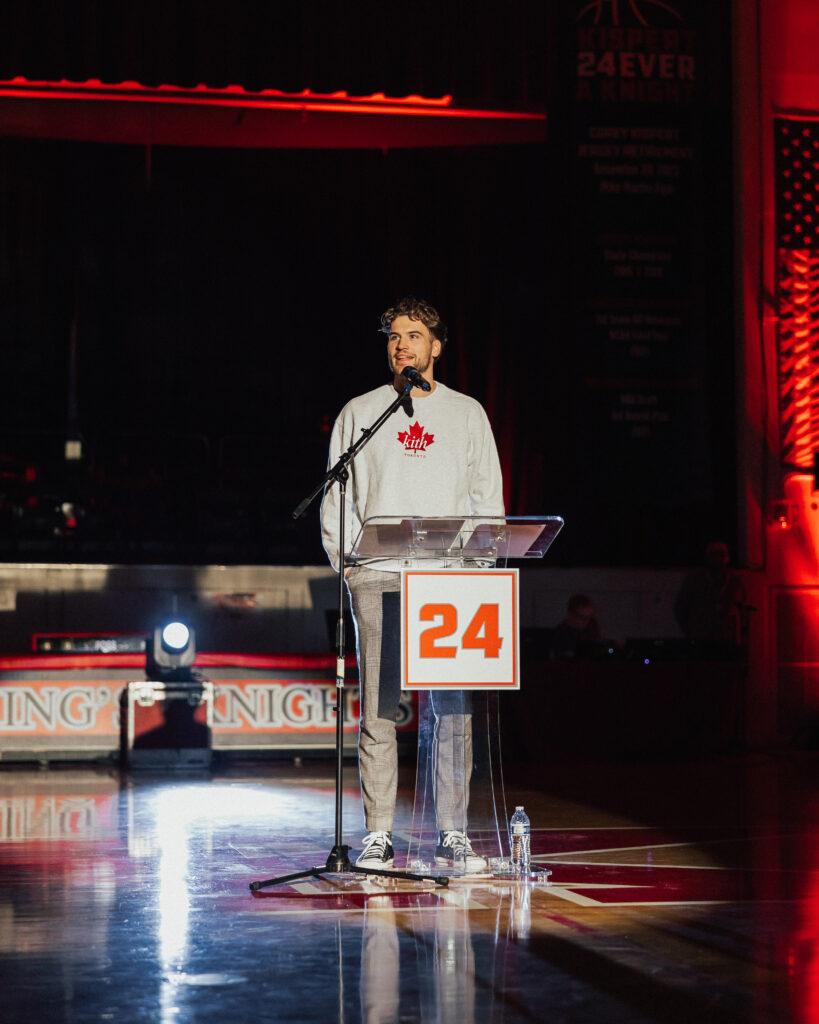
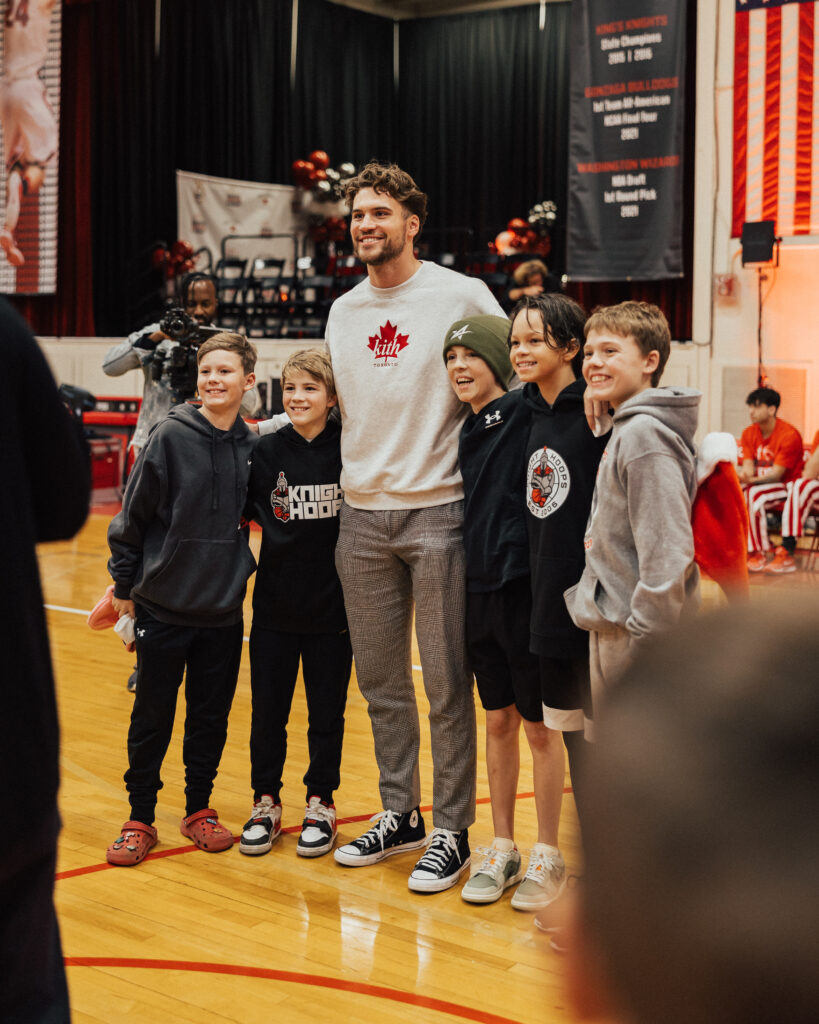
Show Notes:
Find Corey on Instagram | Facebook | X
Transcription:
Corey Kispert:
The last part of that is where Christ will be exalted in my body, whether by life or by death. Obviously, that jumped off the page, because I use my body for a living now. If there’s any sort of way that I can use my gift to bring my faith to the forefront or bring what I believe to the forefront and impact others’ lives, I’m going to jump at that chance.
Sarah Taylor:
My guest today had an All-American career at Gonzaga and was a first round selection in the 2021 NBA draft. Prior to all of that, he was a four-year letterman at King’s High School, on the same campus that I bring you the Passion Meets Purpose podcast. We’re going to talk more about why he’s here on campus today, but first, I have a fun fact for you, Corey. I don’t know if anyone tipped you off to this. This is not the first time we met.
Corey Kispert:
Okay.
Sarah Taylor:
I held you as a newborn.
Corey Kispert:
Oh man.
Sarah Taylor:
My grandparents are Dot and Wayne.
Corey Kispert:
No way.
Sarah Taylor:
They lived across the street from you growing up.
Corey Kispert:
Yeah. Of course.
Sarah Taylor:
I loved babies. And so when I found out that my grand’s neighbor was having twins, she walked me over. We knocked on your door, and I said to your mom, “Can I hold them?” She was like, “Sure.”
Corey Kispert:
Yeah. Of course.
Sarah Taylor:
And so I texted your mom earlier today. I asked her what the best and worst part about having twins was, and here’s what she said. She said, “It was pretty busy, especially when Corey and Casey started to walk. Actually, Corey skipped walking and went straight to running. I’ll let him tell you what the remedy I came up with was, one that I never actually had to use.”
Corey Kispert:
Mm-hmm. Yeah. So I was almost a leash kid. I did have a problem staying and really just following directions or being obedient to my parents, but it wasn’t because I was a bad kid or wanted to disobey. I just had so much energy. That’s why she said I skipped walking, which I don’t believe is true, but that’s why she said it. There were times where we would go to the park, and she would set up everything. She’d turn around, and I’d be gone. Or we would go to, we would be at the grocery store, and I’d be running through the aisles. She just could not keep me within arm’s length. It was impossible.
So what she decided to do was she decided to buy a backpack, really, with a harness that came out of it. The only thing that I didn’t want to do more than sit still was disobey my mom. And so what she would do when I would be fidgety or be running around, or causing trouble, or almost running into the street, she’d just pull out, she’d pull out the harness. She’d kind of start to unzip it, and she’d be like, “Corey.” Then, I’d hear the noise of the zipper, and immediately, I just kind of stuck to her side. Because I didn’t want to disobey her, and I didn’t want to be strapped to a harness. I wanted to run around. I want to have that privilege to do that, and thank God she never had to actually use it. Because that’d be even more embarrassing than the story that I’m telling now.
Sarah Taylor:
When I thought about how our interview would begin, I didn’t think the first words you shared were, “I was almost a leash kid.” Your mom, I remember I told her, I asked her the best and worst part. So that was the hard one. Right?
Corey Kispert:
Mm-hmm.
Sarah Taylor:
Here’s the heartwarming part.
Corey Kispert:
Okay.
Sarah Taylor:
She says, “All three of them sitting in my lap reading books, sitting reading books to themselves, when Corey was really into Bionicles …”
Corey Kispert:
Mm-hmm.
Sarah Taylor:
You’re going to have to tell me what that is.
Corey Kispert:
Okay.
Sarah Taylor:
“… and Casey was really into Barbies. They would play Barbies and Bionicles together. Calvin was also into LEGOs, and Corey was into knocking LEGOs down, which was not very heartwarming to Calvin. We thought it would be a disaster to move the boys into the same room together, but Corey felt so honored to be in a big boy bed with his big brother that overnight, he changed his behavior. They’ve been close ever since.”
Corey Kispert:
Mm-hmm. Yeah. So I guess to start, Bionicles were like a … It’s like a LEGOs type thing. They kind have their own little universe and story and backstory behind them, and you can collect all the characters. There’s movies and TV shows that kind of bring those characters to life, and that’s what I was really into growing up. Like you said, and like you mentioned, my mom mentioned, Casey and I made those two worlds collide between Barbies and Bionicles. And so obviously, that’s something that my mom really cherished and took to heart.
Then, yeah. I really, really, really enjoyed knocking down my brother’s creations. He’s always been a creative guy. He’s an engineer now, or he’d majored in engineering, so always building things, always putting things together. Then, again, kind of a common theme of me being like a rascal, would just run in, and kick them down, laugh, and then leave. Even at a young age, that drove a wedge between me and my brother. But despite all that, I still looked up to him and still do look up to him more than pretty much anybody I know.
She was exactly right. The moment that they decided to move us in together, she got advice from her mom, “Don’t do this. Do not move them in together. It’s going to cause havoc in your house. You’re never going to sleep. The boys are going to be at odds more than they ever were.” But yeah. Like she said, I was just kind of honored to be in the same room as Calvin and to share that, “big boy,” air quotes, “big boy” responsibility. The behavior changed overnight, and I remember there were … My parents set a rule, like, “You can’t get out of bed before 7:00 AM. Even if you wake up and you’re laying in bed, you cannot leave your room until 7:00 AM.”
So Calvin knew how to tell time, and I didn’t. And so I would be constantly asking him at six o’clock, 6:15, 6:30, “Is it seven o’clock yet? Can we go? Can we go?” He would be like, “No, Corey. Go back to sleep.” Finally, we would get up out of bed, and we’d be walking to the kitchen. I would be in lockstep with Calvin our steps. I would be right behind him, and we’d both be sleepy-eyed. I remember a story my mom would tell me about how when Calvin would stop to rub his eyes, I would bump into the back of him, because I was just looking at his feet. I was trying to be in step with my brother, and so I didn’t notice he stopped. I would hit him, and my mom would laugh, and yeah. Calvin and I truly haven’t … I mean, that’s the start of, the, truly, the start of our relationship and what it is now, because he’s really one of my best friends.
Sarah Taylor:
Wow. So good.
Corey Kispert:
Mm-hmm.
Sarah Taylor:
Your mom says she has some pictures of you guys in the back of my papa’s brown truck. Do you remember that truck?
Corey Kispert:
Yeah. I remember the truck. It was always parked out front.
Sarah Taylor:
Yes.
Corey Kispert:
Absolutely.
Sarah Taylor:
Oh. That’s so wild.
Corey Kispert:
Mm-hmm.
Sarah Taylor:
I love that we share that in common. He was so proud of you. Both my grandparents were. Yeah. They loved watching you grow up. Your athletic jeans go back to your grandpa-
Corey Kispert:
Yeah. They sure do.
Sarah Taylor:
… who played for the New York Jets in the 1960s.
Corey Kispert:
Mm-hmm. Yeah. He did, and he swore that I would not be a basketball player and that I was the next Tom Brady. He would swear by it. And so he had football in his jeans. It’s a sport he loved and grew up playing and played professionally. When he had a grandson who was tall and could throw a football, he just gravitated towards it, and I don’t think I’ve ever broke my grandpa’s heart more than telling him that I was done playing football and was going to focus on playing basketball. He was broken up about it and beside himself and begged me to stay or begged me to continue to play football, but yeah. A lot of the athleticism and then also the toughness and determination that I have now is from my grandpa. I 100% know that.
Sarah Taylor:
Mm-hmm. Because yeah. You played every sport you could, whatever was in season growing up.
Corey Kispert:
Yep. Yep.
Sarah Taylor:
When did you make that decision that basketball was the one that you were going to really focus on?
Corey Kispert:
Yeah. Like you said, with the change of the season, was the change of my favorite sport. So it’d be football in the fall and basketball in the winter, and then it would be baseball or golf or whatever in the spring. I did everything. I just played as much as I could, but it got to a point where I was seeing enough success on the basketball court specifically that I remember I sat down with my dad and … Because he was the one. I mean, I was too young to field any phone calls or emails or whatever from college coaches, and when they started calling more frequently, he was like, “Listen, this could be a real thing for you.”
We had a very adult conversation when I was 15 years old about all of what could happen, and he’s like, “Listen, if you want to …” He left the ball in my court. He’s like, “If you want to pursue this, and you want to go after this, that’s great, and I can help you. But if you don’t, and you want to continue to play all the sports and be a kid, really, still, that’s great, too. But you have to let me know what you want to do.”
Sarah Taylor:
Wow.
Corey Kispert:
And so I told him I wanted to play, I wanted play basketball, and he kind of took that and ran with it. Part of it was kind of pushing all the other sports to the side and really narrowing my focus. If it’s worth doing, it’s worth overdoing, and he got that even though when I couldn’t. So that was really, remember those kind of difficult … Those are difficult conversations to have with coaches who wanted me to play on their teams, and it just wasn’t going to be a reality anymore.
Sarah Taylor:
Let’s talk about King’s, King’s High School, which you attended, four-year letterman, took them to two state championships, and MVP of that championship. We’re here on the King’s campus today, because they are retiring your jersey tonight.
Corey Kispert:
Yeah.
Sarah Taylor:
So when did you hear about … Well, first, before we talk about the jersey retirement, let’s talk about, how did King’s set you up both athletically, through their athletics program, and spiritually?
Corey Kispert:
I guess we can start with athletically first. I was blessed to have a basketball coach, specifically, who took his job as a coach very seriously in all forms. It was not only was he up late at night when he had other things to do, trying to help us be the best team that he could for a bunch of 14, 15, 16, 17-year-olds. It made me really appreciate what good coaching is and allowed me to, it allowed me to see what … If a coach can pour into me this much, then it’s kind of my job to return the favor and pour it back in.
We had a really, really good basketball team. We competed not only at our 1A level, but with teams of all levels across the state. My coach was really generous with access to the gym whenever I needed or wanted it. He was always available to open it up for me. One of the most important things, too, was what set me up for my career in the future, was he was not a big sandbagger, sugar-coater. He told you the truth about your game like he saw it, and he really valued honesty, even if it might hurt in the moment.
He kind of, through his philosophy there, even if you heard a hard truth every now and again, it’s better for you in the long run. And it really taught me how to look at myself in the mirror honestly and evaluate who I am as an athlete, specifically, and what I need to do, or change, or get better in order to become a better player.
Sarah Taylor:
That’s such a gift.
Corey Kispert:
Yeah. Such a gift, and it’s easy to, when you’re working with young adults or kids, especially, it’s easy to try to tell them what they want to hear and maybe hope it fades off or it doesn’t come back to bite you in the end. But being able to trust that he could speak honestly with kids about their place on the team was really beneficial for me. I know it was beneficial for everybody, because whether you’re an athlete or you go into a different line of work, you’re going to hear hard truths, and you’re going to hear honesty that you don’t want to hear. To have that foresight to do it when we were really, really young helped me, specifically. I can’t speak for anybody else, but it helped for me in my career moving forward.
Then, spiritually, being at King’s, I mean, it’s just, I mean, I was here since kindergarten. I grew up at King’s, and having the groundwork and years, and years, and years, and years of being poured into and taught what it means to follow Christ in your everyday life was really, really important for me. Having, gosh, 12 years of that, and then also an extra four years of my mom working here as a Bible teacher, too, I got the right messaging from every angle, and learning different perspectives, learning how to defend my own faith, learning how to look at it critically, answer questions of my own, pursue truth. Having the resources and the knowledge that a lot of the teachers have and specialize in, really, in our hallways was something that I definitely leaned back on or leaned on. As I grew, and developed my own faith, and worked on it on my own, the groundwork I had here was really, really important.
Sarah Taylor:
Tell me about, when did they call and say they wanted to do a jersey retirement? What’s it like to have your wife here, your parents here, to be on that court again?
Corey Kispert:
Yeah. I learned about it over the summer. He’s sitting in the room with me now, but my friend Christian was getting married this summer. I got here a few days early with my wife to be here for that, and prepare in whatever way I could, and help him out with their ceremony. One morning, I decided to come here and get a workout in. I still have really good relationships with our coach here now, who coaches here now, and kind of some of the people in the administration. And so they helped me out, and they were there. After I was done with my workout, they kind of floated the idea to me, and, “What do you think?” It was very general. “What do you think? How do you feel about this? We’re thinking about doing something for you. Is that something you think you could even attend?”
At that time, our schedule didn’t really, didn’t come out or wasn’t out yet. So, I mean, I was like, “Obviously, I’m all in. Would love to be here if I can, but I just don’t know if I can.” We play, in the NBA, we play pretty much every other day, and it’s hard to find time to be able to get away and attend something like this, especially in a city that doesn’t have an NBA team. Thankfully, it worked out perfectly that we play Portland tomorrow, and we had a few days off in between. And so as soon as I learned that, the idea kind of started to gain momentum. Honestly, they did most of the legwork on it. It was just up to me to say yes and for me to agree to dates and things like that.
But being back here has been surreal. It’s been really cool. I’ve gotten a chance to catch up with old friends and see what their life is in real time. Some of them, I just talk with on the phone or can barely see throughout the year now, and being able to spend that time with friends and with family face-to-face is really, really important and really lucky considering the time of year that we’re in our season, to be up here. I’m just really excited for whatever is going to happen tonight. I really still don’t know. I know where I’m supposed to be. I know what time I’m supposed to be there, but I’m excited to see what all kind of comes together, and even the fact that we are playing an opponent tonight who has a coach who was on the King’s staff when I was there.
Sarah Taylor:
Oh. Wow.
Corey Kispert:
Yeah. So that kind of full circle … Everything feels like it’s kind of fitting in together perfectly, and yeah. I’m just, I’m really, really excited, and I’m honored. I’m thankful for everybody who did a lot of the legwork when I wasn’t available to.
Sarah Taylor:
Well, we’re excited for you, and I’m so grateful that you were able to make some time to chat today. So I’m kind of following this linearly. We talked about your childhood. We talked about your time at King’s, and then, you had a decision to make, which was a big decision, on where you were going to go to college.
Corey Kispert:
Mm-hmm. Yeah. That was a really big decision, and that’s one of the biggest decisions I’ve made in my life up to this point. It ended up working out great, because it’s, compared to the other schools that I was looking at going to, it’s the closest one to home. It gave my parents an opportunity to come watch me play, other family members. I mean, I have grandparents and cousins who live in Yakima, so they’re halfway there to Spokane. And so that part of it checked the box. I felt like home there when I took visits. The coaching staff, the other players that were there at the time made me feel welcomed without doing anything at all. They just opened the doors to me completely.
As my career kind of unfolded there, everything that I saw and thought was going to happen, good and bad, ended up turning out to be a reality. So it wasn’t this complete success story from start to finish. There were a lot of downs, a lot of dark times, but what ended up, now that I look back on it, being four years that were some of the best experiences in my life. I won a lot of games, had a lot of success. I met my wife, and that all wouldn’t have happened if I wouldn’t have chose to go there. So I can thank Gonzaga, specifically, for a lot of really, really good things in the life of Corey Kispert.
Sarah Taylor:
We highlighted your coach here at King’s. I always just love hearing about what makes a good coach, and so talk to me about those that poured into you at Gonzaga.
Corey Kispert:
Yeah. I mean, a lot of different people. Obviously, the head coach, Mark Few, did an amazing job with me. He had a lot of the qualities that I talked about with my high school coach and what he had. He’s a very honest man. He’s fair, but when you’re kind of the subject of that honesty and that fairness, it doesn’t seem that way. He took a lot of opportunities to pull me aside when he was being hard on me to tell me, “Listen, I know how great you can be. You’re not there yet, and the reason why I’m so hard on you is to get you to that point. It might not seem fair now, but I promise you it’s going to.”
Our relationship matured from a player and a coach, kind of that power difference, to someone who I look forward to talking on the phone with now. He was invited to my wedding. He was at my wedding, and it was amazing, with former teammates and him all getting along. They all kind of have a similar relationship to him as I do now, and he just, he always saw the bigger picture. He always made his steps calculated, and all of the interpersonal stuff aside, he’s just a really, really good basketball coach, too.
He understands the game. He’s coached teams at really high levels for years, and thankfully, he kind of found me worthy to give the keys to and trust with his program and hopefully lead the team to places where we wanted to go. That trust in me from him was a really, really cool thing for me to develop as a leader and develop as a basketball player and all of everything that comes with that.
Sarah Taylor:
Great coaches are a gift.
Corey Kispert:
Yeah.
Sarah Taylor:
I’m pointing at Christian, too.
Corey Kispert:
Yeah.
Sarah Taylor:
Your buddy Christian. Right?
Corey Kispert:
Yeah.
Sarah Taylor:
Christian, say hi.
Christian:
Hello.
Sarah Taylor:
Christian coaches my son’s sixth grade basketball team. To have a coach that pours into you like that is, it’s a game changer.
Corey Kispert:
Mm-hmm.
Sarah Taylor:
Okay. Here’s the deal. On this podcast, I don’t talk about basketball a ton. I’m not your girl for stats. So if anybody listening to this wants more of that technical talk, you can go listen to Brock Huard’s Above & Beyond: The Intersection of Faith and Sports. He has a great episode with Corey. I’m going to pivot us to some other things, because you are good at a lot of things.
Corey Kispert:
Okay. Let’s do it. I’m ready.
Sarah Taylor:
So I’m ready to talk about … Well, Christian tipped me off to this. I’m ready to talk about your golf game.
Corey Kispert:
Wow. A lot of people are giving you some info. You’re good. You’re good. You’re good, good researcher. My golf game, that is what I love to do most other than basketball, is play golf. It’s a hobby of mine that I didn’t really truly fall in love with until I got to college. We spent a lot of our summers in Spokane working out and taking online classes, and we had to be in Spokane. Our whole team did, and there was a really generous … I mean, there were a lot of courses in the area that had, public courses in the area that had really generous college discounts.
And so me and my teammates and buddies that were there in the summer took full advantage of that, and that’s when I kind of caught the golf bug. But then, even now, aside from it being something that I can compete at, and spend time on, and really enjoy doing physically, it’s such a mental de-stressor for me. It’s easy throughout the course of however long our season is, six, seven months, to get wrapped up in what’s going on right now. Whether it’s good games or bad games, or trouble with coaches or teammates, or whatever it is, I feel like I can kind of let it all flush away when I play golf.
I have really good friends who I play with in DC that kind of help remove my focus from basketball. And so when I get back onto the court, my mind feels fresh, my body feels fresh, and I’m ready to play again. But also, what I’ve really realized, and it’s kind of overlooked, is that during a course of a day, I go from an apartment, to a parking garage, to a gym, to a car, to an arena. I’m inside all day long, and so getting outside, period, is something that I’ve really, really figured out is key to health in general, and especially when you play in stuffy gyms and arenas and you’re breathing a lot of air condition all day long. Getting outside and having some fresh air, whatever you’re doing, is pivotal. So there’s a lot of reasons why I love to play golf other than the game itself.
Sarah Taylor:
That makes so much sense. Being in arenas your whole life, you’re like, “Give me these wide open spaces.” All right. I’m going to put you on the spot.
Corey Kispert:
Okay.
Sarah Taylor:
Dream course to play with your dream foursome.
Corey Kispert:
My dream course to play is Augusta National, where they play the Masters every year, and I would like to play it with my dad. I would like to play it with, I would say probably one of my buddies who actually, he still lives here in town. I met him in high school. His name’s Shane Scott. I’m going to play with him. He’d be number three, and then I would probably say Tiger Woods.
Sarah Taylor:
Nice. I like it.
Corey Kispert:
That’s the four.
Sarah Taylor:
Okay. Do you still dig all the water sports?
Corey Kispert:
Yeah. Oh yeah.
Sarah Taylor:
Pickleball?
Corey Kispert:
Uh-huh.
Sarah Taylor:
Is there a sport you don’t like?
Corey Kispert:
I am horrendous with anything that has to do with balance or wheels.
Sarah Taylor:
Okay.
Corey Kispert:
So we’re talking like skateboarding, ice skating, rollerblading, even like … I mean, I can ride a bike, but barely. Any of that stuff is like, that’s kryptonite for me.
Sarah Taylor:
I hear you took an improv class and loved it.
Corey Kispert:
Yeah. I sure did. Sure did. I was actually having a conversation with Christian’s wife yesterday about it, because she was in the improv troupe with me.
Sarah Taylor:
What? Really?
Corey Kispert:
Mm-hmm.
Sarah Taylor:
Tell me more. Was that here at King’s?
Corey Kispert:
Yeah. It was here at King’s.
Sarah Taylor:
Okay. Everyone loves that. Everyone loves that improv class.
Corey Kispert:
Mm-hmm.
Sarah Taylor:
Tell me, what did you like about it?
Corey Kispert:
Looking back on it now, it sharpened my social skills. I mean, part of what improv is and what we learned improv to be was taking whatever someone leads a scene with and just adding to it, and adding to it, and adding to it. Then, all of a sudden, you have this scene made out of completely thin air. The same kind of concept goes for having conversations with people you’ve never met before or people that you’re trying to catch up with. You’re just trying to add, and add, and add to what they’re saying, and all of a sudden, you’re deep in a hour-long conversation. It helped me be light on my feet, think of topics that could be applicable, and it was also just a lot of fun.
Sarah Taylor:
So much fun.
Corey Kispert:
It was a lot of fun, and even if we were bad at it or we weren’t as good as we thought we were, it’s, as embarrassing as it can be to talk about or admit or whatever, it’s a fun fact about me. I mean, I would definitely take that class over again as high school Corey, for sure.
Sarah Taylor:
Was it Mrs. McCardle?
Corey Kispert:
Yeah.
Sarah Taylor:
Shout out, Mrs. McCardle.
Corey Kispert:
Shout out, Mrs. McCardle.
Sarah Taylor:
She’s still doing it.
Corey Kispert:
Yeah.
Sarah Taylor:
I’ve got a high schooler over there now.
Corey Kispert:
She always texted me, or, yeah, she always texted me when I was in college after a good game or something, and she would say, “Not bad for a theater kid.”
Sarah Taylor:
I love that. Yeah. It’s that yes and principle that you’re talking about.
Corey Kispert:
Correct. That’s exactly right.
Sarah Taylor:
I love that. Let’s move on to Jenn.
Corey Kispert:
Yeah. Love talking about her.
Sarah Taylor:
Your sister saw her when, what, they were dropping you off?
Corey Kispert:
Yep.
Sarah Taylor:
Okay. Was it the first day they dropped you off?
Corey Kispert:
One of them, if not the first day. Yeah.
Sarah Taylor:
Okay. She spotted Jenn walking, taking laundry back to her dorm room or whatever, and your sister told you what?
Corey Kispert:
“You’re going to date her one day.” I looked at her like she was crazy. I’m like, “How can you possibly know that?” But again, Casey has had a sixth sense for me. We were twins, and everything that people talk about, maybe the thinking the same thoughts and always knowing what’s going on in their head, isn’t always true. But you have a feel. Right? You have a feel for your twin, and every friendship, or relationship, or encounter that I’ve had with anybody that I start to think is a good thing, I always kind of run it by Casey.
Because she just knows, and she can see things that I don’t see. I think she clearly saw something that I didn’t see. I mean, I thought Jenn was cute and all that, but she took it a step further and obviously was thrilled when I told her that we had become friends, thrilled when I told her we started dating. Then, as they got closer throughout our relationship, she couldn’t … There was just never a bad thing Casey said about her. So from the very jump, it’s been a big green flag for Jenn from Casey, and she was right again, for like the hundredth time.
Sarah Taylor:
She raised a glass at your wedding with the biggest I told you so.
Corey Kispert:
Correct.
Sarah Taylor:
People Magazine covered your wedding.
Corey Kispert:
Mm-hmm.
Sarah Taylor:
Oh. Is Jenn a twin?
Corey Kispert:
She is.
Sarah Taylor:
That’s-
Corey Kispert:
I’m dating a twin, or I’m married, sorry, sorry, I’m married to a twin.
Sarah Taylor:
It’s new. It’s fresh.
Corey Kispert:
It’s fresh.
Sarah Taylor:
It’s fresh.
Corey Kispert:
Right? It’s fresh. Yeah. I never really even got the hang of the whole engaged thing. Yeah, and I haven’t got any hang of the married thing either. So I’m married to a twin, and I’m a twin myself.
Sarah Taylor:
You got the green flag, obviously, from Jenn’s sister?
Corey Kispert:
Yes.
Sarah Taylor:
Okay.
Corey Kispert:
One of my best friends.
Sarah Taylor:
Sweet.
Corey Kispert:
Mm-hmm.
Sarah Taylor:
I love this. Okay. Well, for anyone that’s listening, and you want to see the most beautiful pictures ever, People Magazine covered Corey’s wedding, all the details all the way down to the food you served. I zeroed in on these Pizookies, chocolate chip cookie in a cast iron skillet served with ice cream instead of cake.
Corey Kispert:
That’s correct.
Sarah Taylor:
That is a good move.
Corey Kispert:
It was a hit a hit. It was a hit. If I wasn’t too busy dancing, I would’ve probably had like 12 of them. But that was something that I knew about before I met Jenn, that dessert itself, but that’s a staple of her childhood. That’s the dessert that they had on birthdays and special occasions. There’s a restaurant, a chain, BJ’s that serves it, and they love, love, love, love, love that dessert. So when we were talking about dessert, neither of us wanted to do a traditional cake cutting thing at our wedding. Pizookies was a thought that she flew by me, and I was like, immediately, I was like, “Of course. Why wouldn’t we do anything other than that?”
Sarah Taylor:
So good. We’re going to link up to the People Magazine article in the show notes so that you can see what we’re talking about. Of course, you use the team analogy with Jenn, as well. You work well together as a team. You face problems that come your way as one. I love that. Tell me more about how both of you being part of teams your whole life is helpful stepping into marriage.
Corey Kispert:
Yeah. Wow. I mean, I mentioned earlier in the show about how she gets a lot of what I go through on a day-to-day basis basketball-wise, and her having such a deep experience in team sports and playing sports in general has … She’s a family of … There are five sisters in that family, including Jenn, and all of them play Division I basketball. So it’s like competitive family, athletic family, have experience playing the game that I love. So she doesn’t know anything else besides working as a team, and even when she … During her playing career, she was the ultimate team player, didn’t care about personal stuff, just wanted the team to win and succeed.
So now that I talk about it, it makes perfect sense that she just applies that to our marriage. Of course, I do, too, and part of what a team means, also, is that you’re not going to feel amazing about your teammates every single day. That doesn’t matter, because you’re part of a team. The team’s success comes before your own. So on days where our relationship or we’re mad at each other or whatever happens, which they have, and they will continue to, it doesn’t matter, because our team comes first. Whether that’s conversations we have with about our family, or our personal life, or our travel, or my schedule as a player, or anything in between, it’s always a team-first attitude. For anybody that’s stepping into marriage or thinking about it, I mean, I couldn’t recommend that enough, kind of thinking about it that way.
Sarah Taylor:
Okay. Five total Division I athletes in her family, herself included. You have a very athletic family. What in the world is some sort of a pickup football game on Thanksgiving, or what does something look like if you get all these siblings together?
Corey Kispert:
Yeah. It’s very competitive.
Sarah Taylor:
Even a board game night.
Corey Kispert:
Oh. Jenn’s flipped so many tables. She’s flipped so many tables. She’s way more competitive than I am, and her family is, too. But yeah. Things do get very heated. There’s admittedly been some times where we have to look at each other, and we’re like, “Are you sure this is a good idea to play this game together right now?” or like-
Sarah Taylor:
What’s the game? What’s the game that maybe is not a good idea?
Corey Kispert:
There’s these games we play, Bananagrams, Boggle.
Sarah Taylor:
Taking a jab at Bananagrams.
Corey Kispert:
CATAN, Sorry, Monopoly. Anything, if she plays, she wants to win, and things do get really competitive. It’s fun, too, also. She’s done playing now. She doesn’t play basketball anymore, but her and her sisters play in a hometown high school three-on-three tournament where they all play on the same team. That’s one of my favorite things to watch, is just to watch them compete and watch them go.
Sarah Taylor:
I love it.
Corey Kispert:
Yeah.
Sarah Taylor:
As we come to a close, I want to share the verse that … I think you still have this on your Instagram bio.
Corey Kispert:
Mm-hmm.
Sarah Taylor:
Philippians 1:20?
Corey Kispert:
Mm-hmm.
Sarah Taylor:
“Eagerly expect and hope that I will in no way be ashamed, but will have sufficient courage so that now, as always, Christ will be exalted in my body, whether by life or death.”
Corey Kispert:
Mm-hmm.
Sarah Taylor:
That’s not normally your standard stamp of a verse that you see.
Corey Kispert:
Yeah. It’s, yeah. Yeah.
Sarah Taylor:
And so tell me, why that verse? What does it mean to you?
Corey Kispert:
Well, it resonated with me. I got it when I was … Pretty much was at graduation. Well, I have it tattooed on myself, as well, and it was like a graduation gift for me. And so it’s been a verse that I’ve gravitated to for a long time, and the last part of that is where Christ will be exalted in my body, whether by life or by death. Obviously, that jumped off the page, because I use my body for a living now. You know?
If there’s any sort of way that I can use my gift to bring my faith to the forefront or bring what I believe to the forefront and impact others’ lives, I’m going to jump at that chance. The fact that you can do that through your own body, whether that’s by life, or by playing the game you love, or living a really active life, or by death, it’s just something that seems so easily applicable and kind of clicked and made sense to me right away. So it still means a lot and has been for a long time, or has for a long time.
Sarah Taylor:
Final question for you. The person that would listen to a podcast like this has a unique gift that God has given them. Might be athletic. Might not be. It just, it’s a unique way that he designed them, and once you find what that sweet spot, that lane is, that makes you come alive. You’re thinking, “I can’t believe I get to do this today,” and then you find a way to put that on display to serve and help others. What would you say to someone that is still searching for what that lane is, or maybe they know it, but they have to take the next step? What advice would you have for following that?
Corey Kispert:
Yeah. I mean, I know that pursuing my gift and pouring everything that I have into what I can do has been the most fulfilling thing that I’ve ever done. That doesn’t mean it’s been easy or always enjoyable, but it’s always fulfilling. I believe that no matter what it is, I think everybody has that lane or that sweet spot that they truly feel like they’re created to do. I guess my only advice would be once you find that, be patient in finding it, because it’s exhausting to throw yourself into a bunch of different things all at once.
But once you do find it, give it everything you have, because the life, that you said coming alive, like the life that you receive from doing what you love every day is hard to replace. I was lucky enough to find it early, and some people find it later. But everybody has their something, and once you do find it, do everything in your power to do it as much as you can. Because it just only kicks back more and more life your way.
Follow this podcast:

